Popular Content
Want Email Updates?
Get emails about new stuff.
Be the first to know.
Looking for Something?
Poetic Devices Worksheets & Activities
Poetic devices are techniques that listeners can hear. They are different from figurative language techniques. Poets use both, but poetic devices affect how the poem sounds. When trying to identify poetic devices, you should read the lines out-loud. It may be easier to pick up these techniques with your ears than with your eyes. Here is a collection of worksheets on poetic devices to give you or your students rapid fire practice with this skill.
Poetic Devices Lesson 1
Here is a PowerPoint slideshow lesson on poetic devices. It teaches students about the sounds of poetry: onomatopoeia, rhythm, rhyme, repetition, alliteration, and consonance. It also includes ten practice problems after the lesson. These are great skills to teach while appreciating poetry.

Poetic Devices Worksheet 1
Here are 10 problems to give you or your students practice with poetic devices. Read the poetry snippets, identify two or more poetic devices in use, and explain your answer.
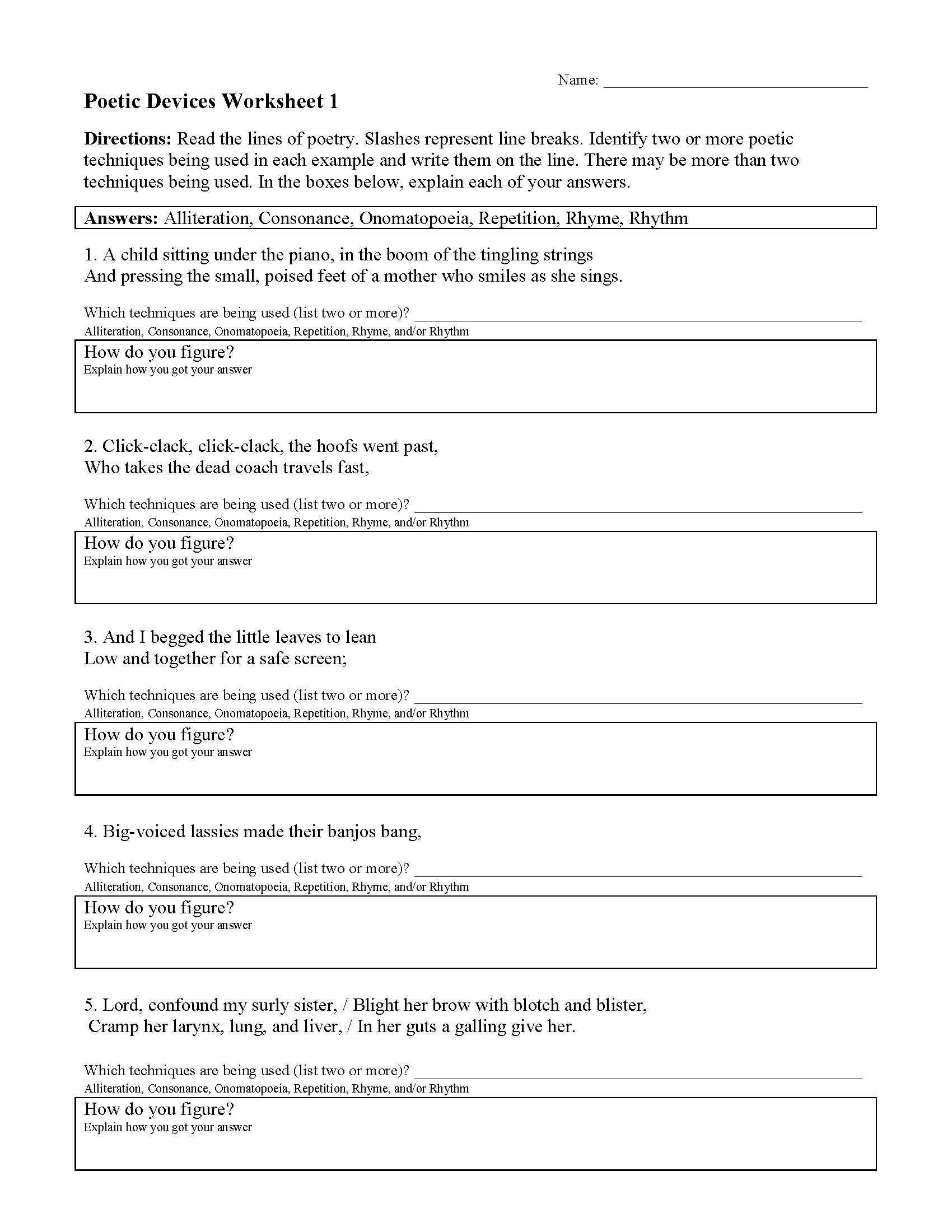
Poetic Devices Worksheet 2
Here is another poetic devices worksheet. This one is five-pages with 26 practice problems. Read the poetry snippets, identify the poetic devices, and explain your answers.
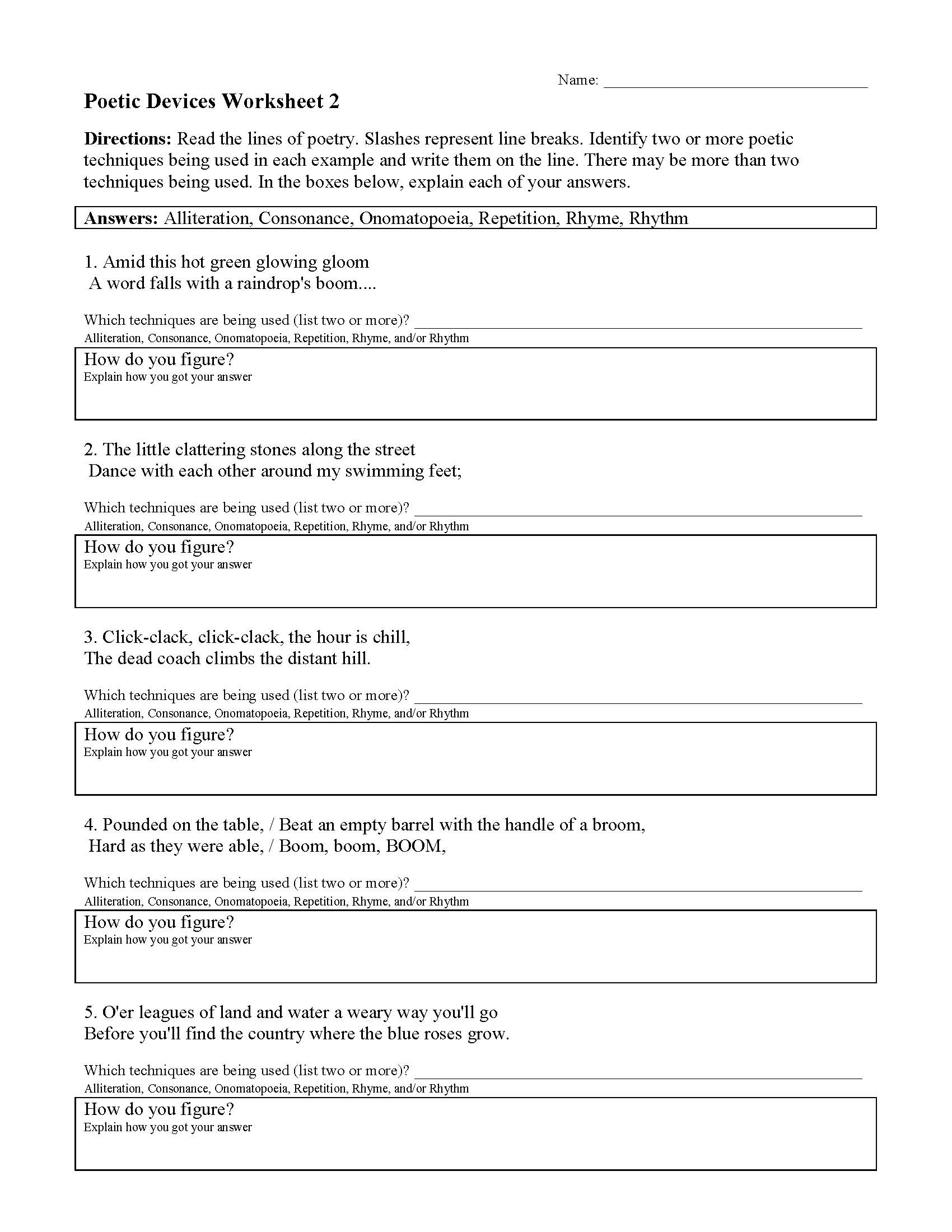
Poetic Devices Worksheet 3
Here is a double-sided poetic devices worksheet. It has ten practice problems. The reading level on this worksehet is a little higher than the first two, which makes it a little bit harder.
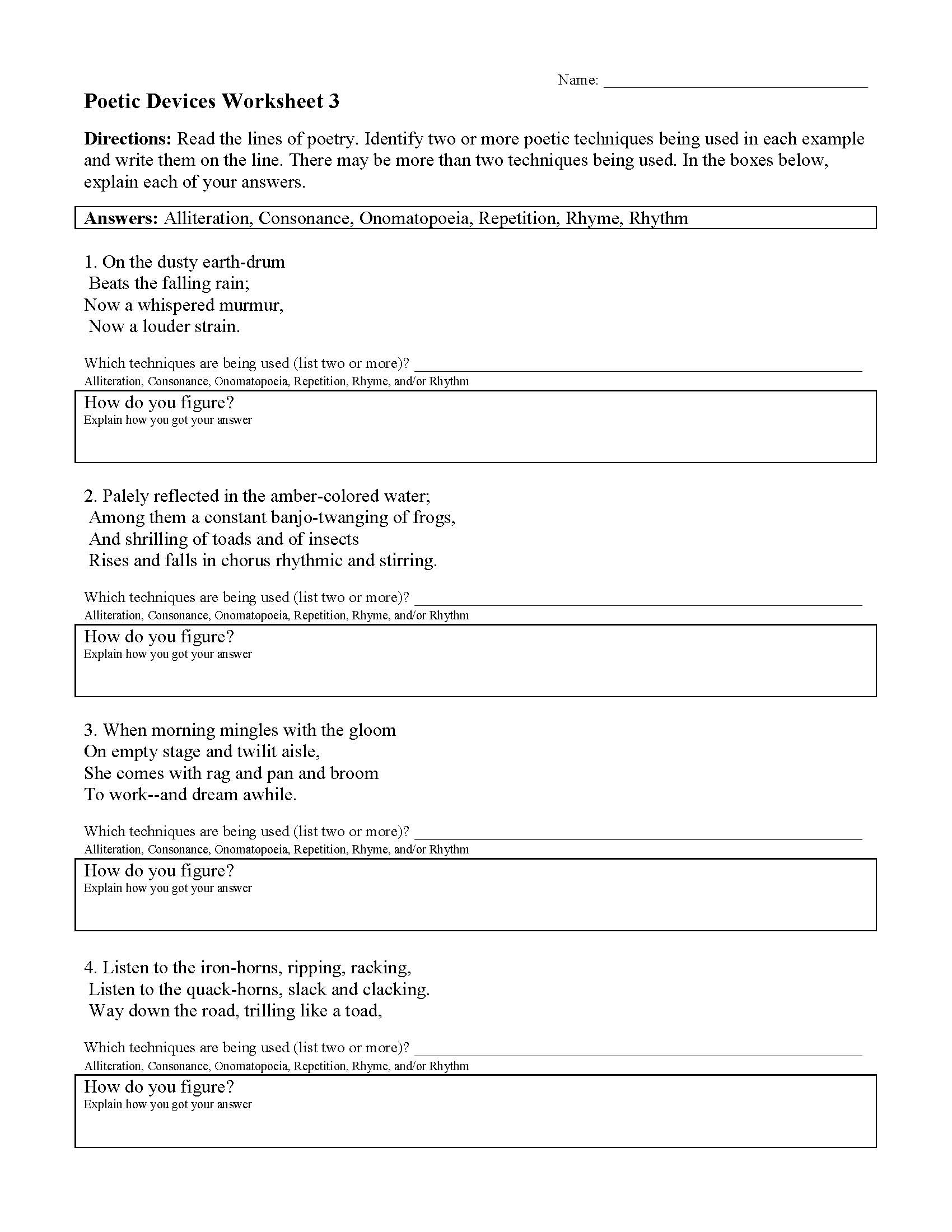
Poetic Devices Worksheet 4
Here is another five page poetic devices worksheet with 26 problems. Some of the examples used in this are pretty difficult. This worksheet is recommended for higher level readers and those approaching mastery.
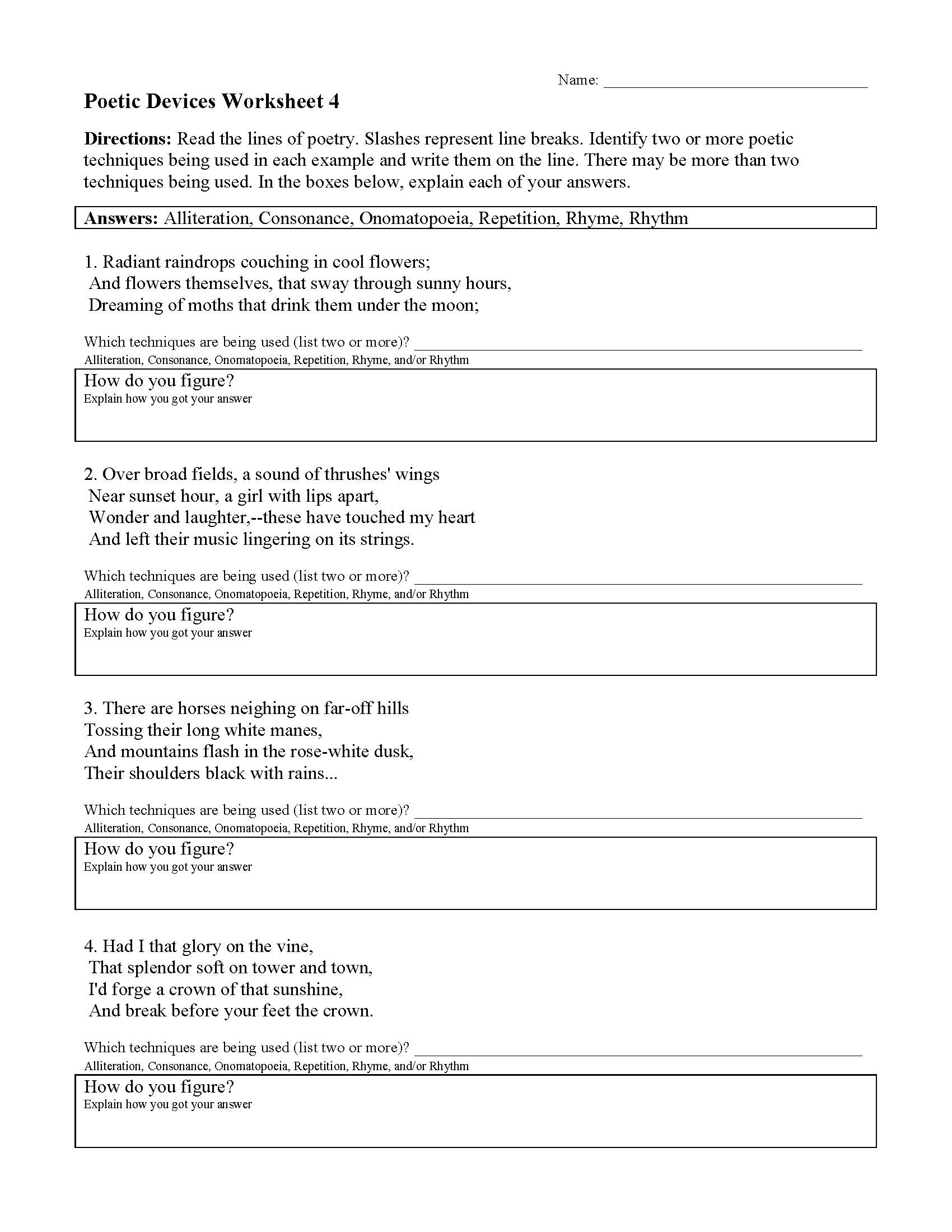
Poetic Devices Worksheet 5
Here is a worksheet to help students master poetic devices. They will try to identify examples of onomatopoeia, rhyme, rhythm, repetition, alliteration, and consonance. This worksheet asks them to identify the techniques and explain their answers.
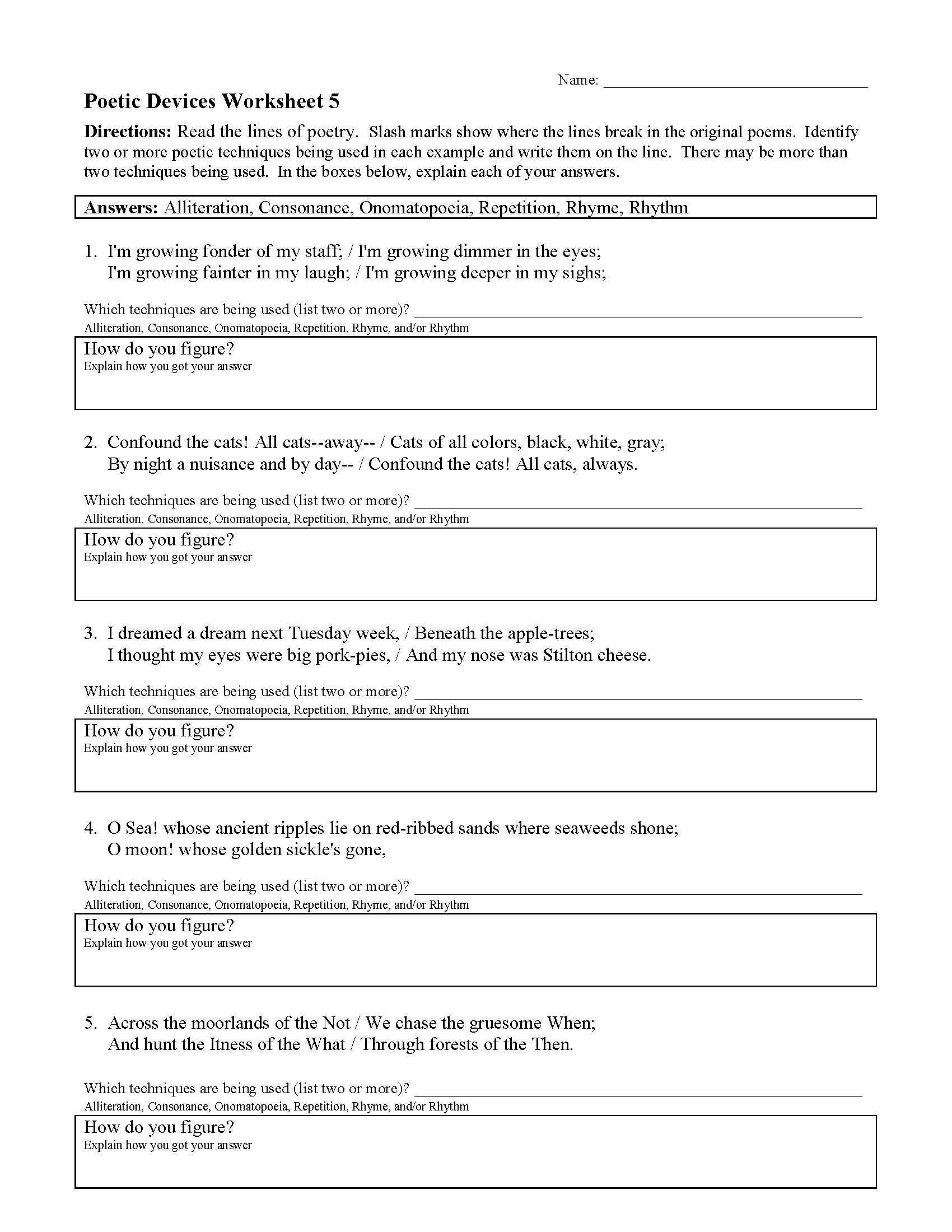
Illustrating Poetic Devices Project
Here is a project to give students some constructive practice with poetic devices. They define poetic devices and then create an example showing understanding. Then they illustrate their examples. These make great artifacts for displaying on a bulletin board.
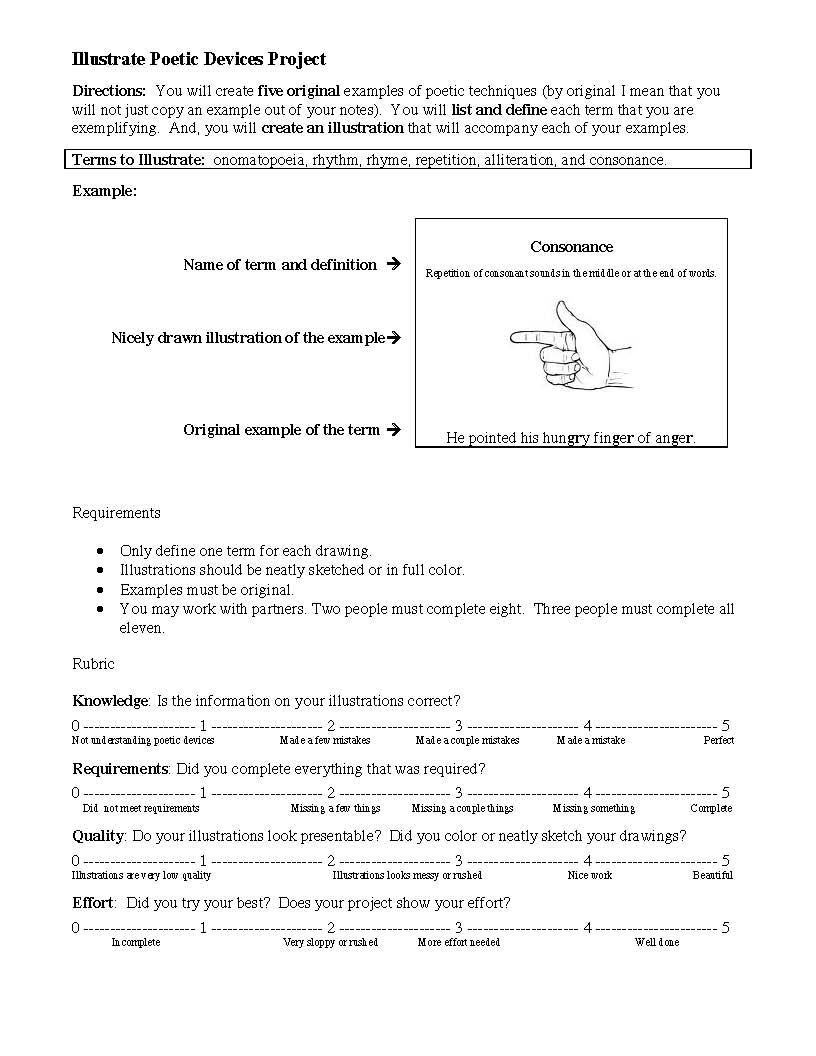
Poetry Cat: Poetic Devices Video Game
This is a fun and free browser game to help you review poetic devices. Students play as a cat and try to collect balls of yarn. When they get hit by an enemy, they have to answer a question to proceed. This game is fun, engaging, and has hundreds of questions on poetic devices. Very educational!
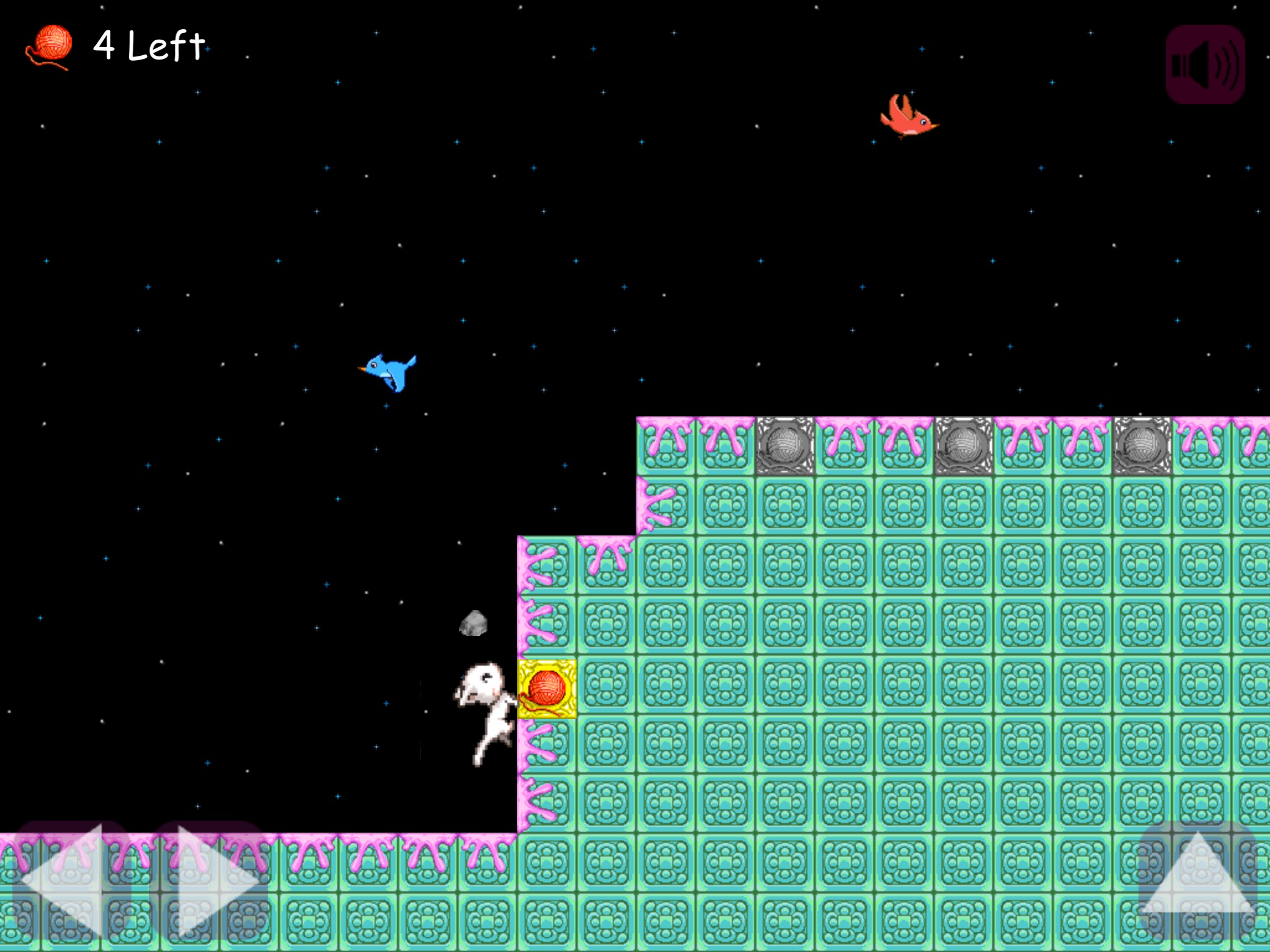

Poetic devices can be quite lovely.
Figurative Language
Common Core State Standards
Figurative Language Anchor Standards
R.4 - Interpret words and phrases as they are used in a text, including determining technical, connotative, and figurative meanings, and analyze how specific word choices shape meaning or tone.RL.2.4 - Describe how words and phrases (e.g., regular beats, alliteration, rhymes, repeated lines) supply rhythm and meaning in a story, poem, or song.
RL.3.4 - Determine the meaning of words and phrases as they are used in a text, distinguishing literal from nonliteral language.
RL.4.4 - Determine the meaning of words and phrases as they are used in a text, including those that allude to significant characters found in mythology (e.g., Herculean).
RL.5.4 - Determine the meaning of words and phrases as they are used in a text, including figurative language such as metaphors and similes.
RL.6.4 - Determine the meaning of words and phrases as they are used in a text, including figurative and connotative meanings; analyze the impact of a specific word choice on meaning and tone.
RL.7.4 - Determine the meaning of words and phrases as they are used in a text, including figurative and connotative meanings; analyze the impact of rhymes and other repetitions of sounds (e.g., alliteration) on a specific verse or stanza of a poem or section of a story or drama.
RL.8.4 - Determine the meaning of words and phrases as they are used in a text, including figurative and connotative meanings; analyze the impact of specific word choices on meaning and tone, including analogies or allusions to other texts.
RL.9-10.4 - Determine the meaning of words and phrases as they are used in the text, including figurative and connotative meanings; analyze the cumulative impact of specific word choices on meaning and tone (e.g., how the language evokes a sense of time and place; how it sets a formal or informal tone).
RL.11-12.4 - Determine the meaning of words and phrases as they are used in the text, including figurative and connotative meanings; analyze the impact of specific word choices on meaning and tone, including words with multiple meanings or language that is particularly fresh, engaging, or beautiful. (Include Shakespeare as well as other authors.)
Click to VIEW Grade Level Standards for R.4
L.5 - Demonstrate understanding of figurative language, word relationships, and nuances in word meanings.
L.3.5a - Distinguish the literal and nonliteral meanings of words and phrases in context (e.g., take steps).
L.4.5 - Demonstrate understanding of figurative language, word relationships, and nuances in word meanings.
L.4.5a - Explain the meaning of simple similes and metaphors (e.g., as pretty as a picture) in context.
L.5.5a - Interpret figurative language, including similes and metaphors, in context.
L.6.5 - Demonstrate understanding of figurative language, word relationships, and nuances in word meanings.
L.6.5a - Interpret figures of speech (e.g., personification) in context.
L.7.5 - Demonstrate understanding of figurative language, word relationships, and nuances in word meanings.
L.7.5a - Interpret figures of speech (e.g., literary, biblical, and mythological allusions) in context.
L.8.5 - Demonstrate understanding of figurative language, word relationships, and nuances in word meanings.
L.8.5a - Interpret figures of speech (e.g. verbal irony, puns) in context.
L.9-10.5 - Demonstrate understanding of figurative language, word relationships, and nuances in word meanings.
L.11-12.5 - Demonstrate understanding of figurative language, word relationships, and nuances in word meanings.
L.11-12.5a - Interpret figures of speech (e.g., hyperbole, paradox) in context and analyze their role in the text.
L.3.5a - Distinguish the literal and nonliteral meanings of words and phrases in context (e.g., take steps).
L.4.5 - Demonstrate understanding of figurative language, word relationships, and nuances in word meanings.
L.4.5a - Explain the meaning of simple similes and metaphors (e.g., as pretty as a picture) in context.
L.5.5a - Interpret figurative language, including similes and metaphors, in context.
L.6.5 - Demonstrate understanding of figurative language, word relationships, and nuances in word meanings.
L.6.5a - Interpret figures of speech (e.g., personification) in context.
L.7.5 - Demonstrate understanding of figurative language, word relationships, and nuances in word meanings.
L.7.5a - Interpret figures of speech (e.g., literary, biblical, and mythological allusions) in context.
L.8.5 - Demonstrate understanding of figurative language, word relationships, and nuances in word meanings.
L.8.5a - Interpret figures of speech (e.g. verbal irony, puns) in context.
L.9-10.5 - Demonstrate understanding of figurative language, word relationships, and nuances in word meanings.
L.11-12.5 - Demonstrate understanding of figurative language, word relationships, and nuances in word meanings.
L.11-12.5a - Interpret figures of speech (e.g., hyperbole, paradox) in context and analyze their role in the text.
Click to VIEW Grade Level Standards for L.5
Still looking for something?
Search here.
Search here.
Leave a comment
35 Comments
Leave a Reply to sheila b. jumawan Cancel reply
By Using This Website You Agree to the Terms of Use and are aware of our privacy policy.
Subscribe Now
Get emails about new stuff.
Don't worry. I hate spam too.
Some Other Useful Pages
- Author's Purpose Worksheets
- Characterization Worksheets
- Conflict Worksheets
- Fact and Opinion Worksheets
- Figurative Language Activities
- Figurative Language Poems with Questions
- Genre Activities
- Irony Worksheets
- Making Predictions
- Mood Worksheets
- Nonfiction Passages and Functional Texts
- Parts of Speech Worksheets
- Poetic Devices
- Point of View Worksheets
- School Project Ideas
- Setting Worksheets
- Simile and Metaphor Worksheets
- Story Structure Worksheets
- Text Structure Worksheets
- Theme Worksheets
- Tone Worksheets
- ALL PAGES AND WORKSHEETS
Search This Site





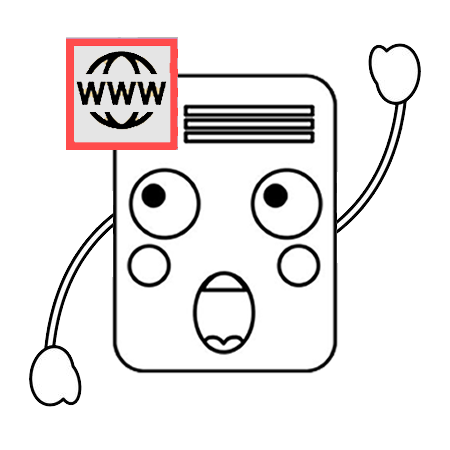

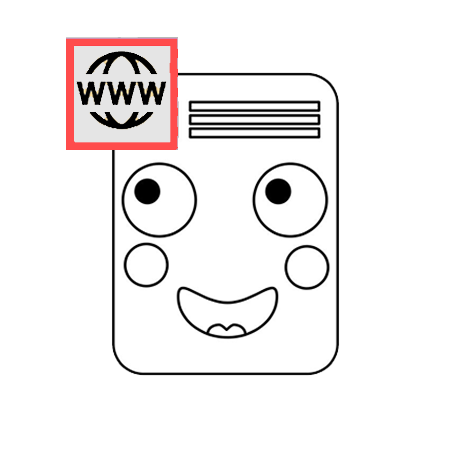
ramya
/ September 26, 2020loved the structured worksheets.In love with them.They are really helpful to both me and my students.Thank you so much!!!!
Preshy Oges
/ July 27, 2020You are really amazing sharing these perfect worksheets. We teachers are glad to visit your site. Thank you!
Steve Finch
/ November 25, 2019Great site I use it with my GED students in Reading and have shared it with the Language Arts teachers. Really appreciate it as a resource.
Nina
/ November 9, 2019Thank you for providing such wonderful resources.
Hina Amber
/ September 28, 2019it is very helpful for teachers.
Sylvia
/ March 18, 2019Great resource! The problems with 20 or more only have the first page of answers that you have posted. just letting you know.
Mr. Morton
/ March 28, 2019There is a little arrow that you can click above the answer keys to see the second page. I should probably work on my UI.
Deokie Fleming
/ February 26, 2019These serve as excellent review for students on poetic devices.
J. Hawks
/ February 15, 2019Thank you so much for providing this service! I use this site often.
Fiona
/ January 10, 2019Thank you so much for this. You are so amazing for taking the time to do this. Just wanted you to know how much this helps!
aman
/ December 24, 2018Thanks so much for sharing your valuable work.
shannon wilson
/ November 27, 2018Are there complete answer keys somewhere? The ones provided are only half. I need to leave them for a sub. Thanks
Ruby
/ September 5, 2018Thank You for Sharing your resources …
Mudasir
/ May 21, 2018Best of the best.
Yona Triestman
/ January 28, 2018You are a saint for sharing your brilliant work for free with the public! I thank you, and also on behalf of my students. Looking forward to further reading:)
Mr. Morton
/ January 31, 2018Thank you for taking the time to comment!
mercedes meta
/ January 5, 2018Thank you so much. Are very, very useful. May god bless you for posting them.
Dilshad Mumu
/ May 13, 2017This is really helpful.It will help much in exam.
Alison Boros
/ April 4, 2016I love your site. A new teacher’s dream. You explain everything with simplicity. I use your PowerPoints and figurative language worksheets for that much needed practice.
Thank you so much.
Trish
/ January 16, 2016This is fantastic resources, just wondering as a teacher/tutor am i allowed to download worksheets to print out copies to hand out to my students?
thank you
Mr. Morton
/ January 19, 2016You sure are. That’s the whole point of the website. Thanks for visiting and I hope that you find some of my materials useful and enriching.
Mrs. Golden
/ October 29, 2015I am so impressed with your hard work! Thank you! This is one of the best contributions to the educational system in a long time. You have saved me hours of time!
anne mauldin
/ January 9, 2015These poetry examples and worksheets are perfect for reinforcement before the state test. Thanks so much for your hard work and willingness to share!
sheila b. jumawan
/ September 15, 2014Thank you so much… the explanations and examples are indeed helpful.
Mr. Morton
/ September 18, 2014I’m happy to hear it. Thanks for taking the time to comment.
Emily
/ August 19, 2014Wow! What a great resource this website is. Thank you for your hard work.
Mr. Morton
/ August 19, 2014You are most welcome. Thank you for visiting.
Brianna Roebuck
/ December 10, 2017There is one more you need to put on there which is Identifying Poetic Devices the one that starts at The moon is faithful,although blind I search up the page but it shows me the answer but does not show mw explain how you figure out answer help me please thank you.
Teresa
/ March 6, 2014I am a first year teacher also, and you have done an outstanding job! Everything that I am trying to teach, you have an example with work that goes along. I am glad I was snowed in these last few days or I would never have found you!
Mr. Morton
/ April 21, 2014I’m so happy that you did.
Look forward to some big additions to this page and others over the summer.
Amanda
/ September 27, 2013As a first year teacher, and a Special Education teacher that is teaching ELAR (for sped) it is amazing to find things like this that other people are using/have used. Thank you so much for sharing!
Mrs. Barton
/ January 16, 2013Thank you for so many amazing reinforcement sheets. It’s very kind of you to share this with your colleagues. It is very much appreciated.
Shuniece
/ April 20, 2011Can you post the answers for the poetic devices worksheets… please? Seeing that there’s more than one answer I just want to see that I see what you see…. thanks!!
Mr. Morton
/ June 2, 2011Done, but I haven’t found time to explain them all.
I would like to do so soon.